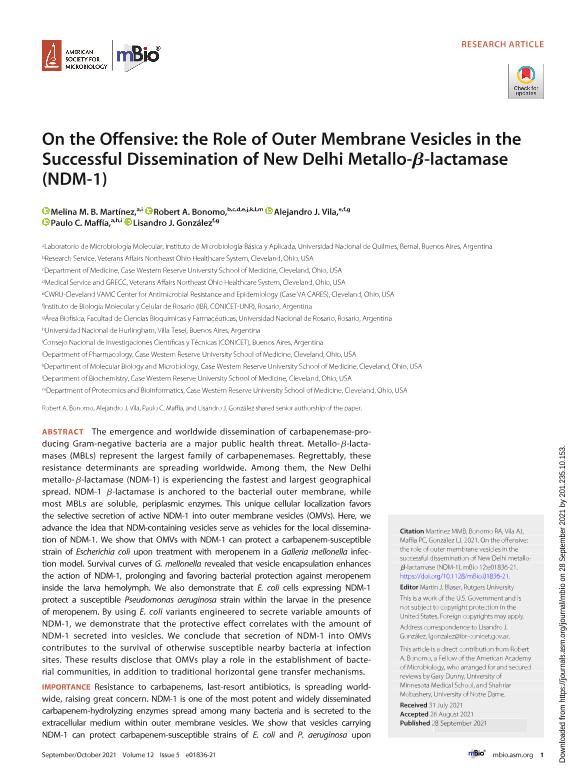Mostrar el registro sencillo del ítem
dc.contributor.author
Martínez, Melina María Belén

dc.contributor.author
Bonomo, Robert A.
dc.contributor.author
Vila, Alejandro Jose

dc.contributor.author
Maffia, Paulo Cesar

dc.contributor.author
Gonzalez, Lisandro Javier

dc.date.available
2023-01-27T19:08:01Z
dc.date.issued
2021-10
dc.identifier.citation
Martínez, Melina María Belén; Bonomo, Robert A.; Vila, Alejandro Jose; Maffia, Paulo Cesar; Gonzalez, Lisandro Javier; On the Offensive: The Role of Outer Membrane Vesicles in the Successful Dissemination of New Delhi Metallo-b-lactamase (NDM-1); American Society for Microbiology; MBio; 12; 5; 10-2021; 1-13
dc.identifier.uri
http://hdl.handle.net/11336/186002
dc.description.abstract
The emergence and worldwide dissemination of carbapenemase-producing Gram-negative bacteria are a major public health threat. Metallo-b-lactamases (MBLs) represent the largest family of carbapenemases. Regrettably, these resistance determinants are spreading worldwide. Among them, the New Delhi metallo-b-lactamase (NDM-1) is experiencing the fastest and largest geographical spread. NDM-1 b-lactamase is anchored to the bacterial outer membrane, while most MBLs are soluble, periplasmic enzymes. This unique cellular localization favors the selective secretion of active NDM-1 into outer membrane vesicles (OMVs). Here, we advance the idea that NDM-containing vesicles serve as vehicles for the local dissemination of NDM-1. We show that OMVs with NDM-1 can protect a carbapenem-susceptible strain of Escherichia coli upon treatment with meropenem in a Galleria mellonella infection model. Survival curves of G. mellonella revealed that vesicle encapsulation enhances the action of NDM-1, prolonging and favoring bacterial protection against meropenem inside the larva hemolymph. We also demonstrate that E. coli cells expressing NDM-1 protect a susceptible Pseudomonas aeruginosa strain within the larvae in the presence of meropenem. By using E. coli variants engineered to secrete variable amounts of NDM-1, we demonstrate that the protective effect correlates with the amount of NDM-1 secreted into vesicles. We conclude that secretion of NDM-1 into OMVs contributes to the survival of otherwise susceptible nearby bacteria at infection sites. These results disclose that OMVs play a role in the establishment of bacterial communities, in addition to traditional horizontal gene transfer mechanisms. IMPORTANCE Resistance to carbapenems, last-resort antibiotics, is spreading worldwide, raising great concern. NDM-1 is one of the most potent and widely disseminated carbapenem-hydrolyzing enzymes spread among many bacteria and is secreted to the extracellular medium within outer membrane vesicles. We show that vesicles carrying NDM-1 can protect carbapenem-susceptible strains of E. coli and P. aeruginosa upon treatment with meropenem in a live infection model. These vesicles act as nanoparticles that encapsulate and transport NDM-1, prolonging and favoring its action against meropenem inside a living organism. Secretion of NDM-1 into vesicles contributes to the survival of otherwise susceptible nearby bacteria at infection sites. We propose that vesicles play a role in the establishment of bacterial communities and the dissemination of antibiotic resistance, in addition to traditional horizontal gene transfer mechanisms.
dc.format
application/pdf
dc.language.iso
eng
dc.publisher
American Society for Microbiology

dc.rights
info:eu-repo/semantics/openAccess
dc.rights.uri
https://creativecommons.org/licenses/by-nc-sa/2.5/ar/
dc.subject
CROSS-SPECIES PROTECTION
dc.subject
E. COLI
dc.subject
GALLERIA MELLONELLA
dc.subject
METALLO-Β-LACTAMASE
dc.subject
NDM
dc.subject
NDM-1 CARBAPENEMASE
dc.subject
OUTER MEMBRANE VESICLES
dc.subject
P. AERUGINOSA
dc.subject.classification
Biología Celular, Microbiología

dc.subject.classification
Ciencias Biológicas

dc.subject.classification
CIENCIAS NATURALES Y EXACTAS

dc.subject.classification
Bioquímica y Biología Molecular

dc.subject.classification
Ciencias Biológicas

dc.subject.classification
CIENCIAS NATURALES Y EXACTAS

dc.title
On the Offensive: The Role of Outer Membrane Vesicles in the Successful Dissemination of New Delhi Metallo-b-lactamase (NDM-1)
dc.type
info:eu-repo/semantics/article
dc.type
info:ar-repo/semantics/artículo
dc.type
info:eu-repo/semantics/publishedVersion
dc.date.updated
2022-09-19T16:02:44Z
dc.identifier.eissn
2150-7511
dc.journal.volume
12
dc.journal.number
5
dc.journal.pagination
1-13
dc.journal.pais
Estados Unidos

dc.journal.ciudad
Washington
dc.description.fil
Fil: Martínez, Melina María Belén. Consejo Nacional de Investigaciones Científicas y Técnicas; Argentina. Universidad Nacional de Quilmes. Departamento de Ciencia y Tecnologia. Instituto de Microbiologia Basica y Aplicada.; Argentina. Universidad Nacional de Quilmes. Departamento de Ciencia y Tecnología. Laboratorio de Microbiología Molecular; Argentina
dc.description.fil
Fil: Bonomo, Robert A.. Veterans Affairs Northeast Ohio Healthcare System; Estados Unidos. Case Western Reserve University; Estados Unidos. CWRU-Cleveland VAMC Center for Antimicrobial Resistance and Epidemiology; Estados Unidos
dc.description.fil
Fil: Vila, Alejandro Jose. Consejo Nacional de Investigaciones Científicas y Técnicas. Centro Científico Tecnológico Conicet - Rosario. Instituto de Biología Molecular y Celular de Rosario. Universidad Nacional de Rosario. Facultad de Ciencias Bioquímicas y Farmacéuticas. Instituto de Biología Molecular y Celular de Rosario; Argentina. Universidad Nacional de Rosario. Facultad de Ciencias Bioquímicas y Farmacéuticas. Departamento de Química Biológica. Área Biofísica; Argentina. CWRU-Cleveland VAMC Center for Antimicrobial Resistance and Epidemiology; Estados Unidos
dc.description.fil
Fil: Maffia, Paulo Cesar. Consejo Nacional de Investigaciones Científicas y Técnicas; Argentina. Universidad Nacional de Quilmes. Departamento de Ciencia y Tecnologia. Instituto de Microbiologia Basica y Aplicada.; Argentina. Universidad Nacional de Hurlingham; Argentina. Universidad Nacional de Quilmes. Departamento de Ciencia y Tecnología. Laboratorio de Microbiología Molecular; Argentina
dc.description.fil
Fil: Gonzalez, Lisandro Javier. Consejo Nacional de Investigaciones Científicas y Técnicas. Centro Científico Tecnológico Conicet - Rosario. Instituto de Biología Molecular y Celular de Rosario. Universidad Nacional de Rosario. Facultad de Ciencias Bioquímicas y Farmacéuticas. Instituto de Biología Molecular y Celular de Rosario; Argentina. Universidad Nacional de Rosario. Facultad de Ciencias Bioquímicas y Farmacéuticas. Departamento de Química Biológica. Área Biofísica; Argentina
dc.journal.title
MBio
dc.relation.alternativeid
info:eu-repo/semantics/altIdentifier/url/https://journals.asm.org/doi/10.1128/mBio.01836-21
dc.relation.alternativeid
info:eu-repo/semantics/altIdentifier/doi/http://dx.doi.org/10.1128/mBio.01836-21
Archivos asociados
